A skyrocketing price and fast-growing adoption rate are just some of the many reasons why Bitcoin (BTC) remains popular with many crypto enthusiasts and investors. But apart from people from the finance and technology world, cyber hackers lurking on the Internet are also working round the clock to get their hands on one of the world’s most traded digital currencies.
If you’re looking for ways to protect your crypto funds from potential attacks online, storing your money in Bitcoin hardware wallets can be one of your best solutions. Let’s get you started with the essential things you need to know about them.
Bitcoin hardware wallet in a nutshell
Bitcoin hardware wallets fall under the category of cold crypto wallets. This type of digital wallet is a physical device that is accessible without an Internet connection, making it one of the most secure options on the market. To set up a hardware wallet for Bitcoin and other cryptocurrencies, you have to keep these three important components in mind:
- Public address – This serves as the username for your crypto wallet.
- Private keys – This is the password you need to access your wallet. Note that only you must know this information.
- Seed phrase – This is a list of 12 to 24 words that you can use to recover your wallet if you happen to misplace, forget, or lose your keys.
Today, there are lots of Bitcoin hardware wallet brands to choose from, but which ones should you actually get?
Best Bitcoin hardware wallets
Here are some of the best Bitcoin hardware wallets, in no particular order, for you to check out.
Ledger Nano X
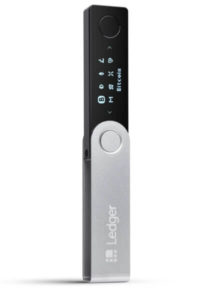
Price: 119 USD
Pros:
- Can store up to 100 apps
- Offers multiple connectivity options
- Supports multiple cryptocurrencies
Cons:
- Bluetooth integration can make the device vulnerable to hacking
Best suited for:
- Users who hold multiple types and huge amounts of crypto
This type of Bitcoin hardware wallet is produced by one of the most popular tech brands in the crypto space. Ledger Nano X allows you to do more with your crypto. Aside from securely storing your Bitcoin, you can also buy, sell, manage, and track your coins from your smartphone or personal computer through Ledger Live and the company’s partner platforms.
Currently, it supports 27 coins and over 1,500 assets such as BTC, Ethereum (ETH), Ripple (XRP), and Stellar (XLM), to name a few. You can use it with Windows, macOS, and Linux devices, as well as iOS and Android on mobile devices. It also comes with a USB Type-C cable and Bluetooth, making device connections easier and faster. Apart from that, you can also install up to 100 apps, depending on your storage and security needs.
Trezor Model T
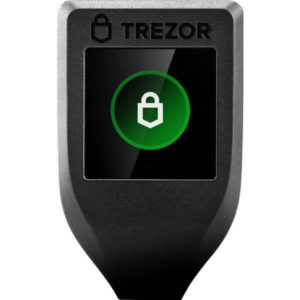
Price: 181 USD
Pros:
- Supports multiple apps and software
- Supports multiple cryptocurrencies
Cons:
- High-priced
- Small touchscreen
- Not available on iOS and Windows devices
Best suited for:
- Beginners looking for a secure device that’s easy to use
Trezor Model T is very much similar to the first wallet on this list. It also has a USB Type-C cable, which you can use to connect to a computer or smartphone. It supports over 1,200 cryptocurrencies, including BTC, ETH, Litecoin (LTC), Ethereum Classic (ETC), Dash (DASH), Bitcoin Cash (BCH), Zcash (ZEC), and many more.
It also supports different applications and software, such as Password Manager, Secure Socket Shell (SSH), GNU Privacy Guard (GPG), Universal 2nd-Factor (U2F), and more to manage your crypto and digital identity securely.
Trezor Model T has a touch screen feature, which makes it ideal for beginners. It also has a MicroSD card slot where you can encrypt your PIN to protect your device from potential attacks. This Bitcoin hardware wallet supports Windows, macOS, and Linux devices, and Android mobile devices—yup, it’s not on iOS and Windows phones yet.
Ledger Nano S
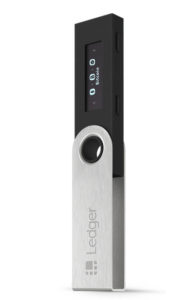
Price: 59 USD
Pros:
- Low price
- Supports multiple cryptocurrencies
Cons:
- Can store up to 6 apps
- No wireless connectivity feature
- Limited storage
Best suited for:
- Users looking for a highly secure device at a lower cost
This is one of the best-selling models of Bitcoin hardware wallets on the market. It’s very similar to Ledger’s newest model, Nano X, in terms of some security features. However, Ledger Nano S can only store up to six applications, depending on the app size.
It can also manage 27 cryptocurrencies, including BTC, ETH, XRP, BCH, XLM, and more, as well as ERC20 tokens via the Ledger Live app. Like the Ledger Nano X, it is also compatible with Windows, macOS, and Linux devices. You just need to have an on-the-go (OTG) kit to connect your Nano S to Android devices and desktop computers.
BitBox02
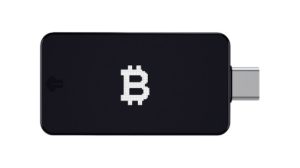
Price: 133 USD
Pros:
- Supports multiple cryptocurrencies
- Capacitive touch sensor feature
Cons:
- Touch sensors can lose sensitivity and accuracy over time
- Not available on iOS devices
Best suited for:
- Users looking for hardware storage solely for BTC
This Swiss-engineered device is dubbed as one of the best crypto hardware wallets for beginners. It uses capacitive touch sensors to interact with and use the device. BitBox02 also has an easy backup and restore feature, which uses a microSD card to instantly manage the backup from the device. It also offers an option to display your 24 recovery words or your seed phrase.
It supports BTC, ETH, LTC, and ERC-20 tokens such as Chainlink (LINK), Dai (DAI), Tether (USDT), and more. BitBox02 also has U2F support and a secure chip that protects your device and crypto funds from physical tampering. It is compatible with Windows, macOS, Linux, and Android devices.
Interestingly, BitBox has two editions: the Multi-edition that supports multiple cryptocurrencies and the Bitcoin-only edition, which is solely for BTC. Currently, both devices are offered at the same price, so it’s up to you to decide if you should focus on one crypto or more.
KeepKey
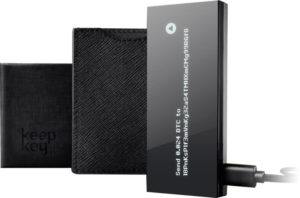
Price: 49 USD
Pros:
- Supports multiple cryptocurrencies
- The cheapest device on the list
- Large touchscreen display
Cons:
- Touchscreen sensitivity and accuracy can decrease over time
Best suited for:
- Users looking for cheaper storage with easy backup and recovery features
KeepKey Bitcoin hardware wallet is the cheapest device we have on this list. It offers unique features like straightforward backup and recovery, sleek and simple display, effortless exchanges, and more.
KeepKey devices have a feature that generates a 12-word recovery sentence during initialization, which can be used to recover your private keys. It also has a sleek style and large display, which makes it easier to navigate and use.
You can keep, send, and receive over 40 cryptocurrencies that KeepKey supports. This includes BTC, ETH, BCH, Dash, LTC, and a lot more. It also allows you to customize transaction speeds and generate limitless wallet addresses on one device.
Before you choose a hardware wallet
While hardware wallets minimize the risk of potential technical danger that’s present in some online exchanges and wallets, it’s important to note that this type of device is still not 100% secure—especially as it depends on your type of crypto activities.
Before choosing which hardware wallet to get for your hard-earned crypto funds, don’t forget to check the company provider’s history. We’re talking about your money here, so you need to get a hardware wallet from a credible and reliable provider. You also need to look at its security features and the availability of customer support should you have any urgent inquiries about your device. Lastly, it’s better to choose one that is accessible and easier for you to use.
These are just a few of the many Bitcoin hardware wallets out there, so don’t be limited to this list. Carefully look at the features of each device and pick the one that best matches your storage needs. Once you have a hardware wallet, read our guide on how to transfer crypto from an online wallet to a hardware wallet.
What other hardware wallet devices should we put on this list? Let us know in the comments!